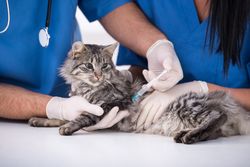
Regardless of whether your cat stays indoors or roams around the neighborhood, it’s important to stay up to date with pet vaccinations and veterinarian checkups. Doing so is the best way to prevent serious diseases that could impact your feline’s quality of life. To be better prepared to care for your cat, below are a few common illnesses to keep on your radar.
4 Diseases Every Cat Owner Should Know About
1. Worms
Parasites live in feces, which makes outdoor cats vulnerable to contracting harmful organisms that turn into intestinal worms. Roundworms and tapeworms are two common causes for concern. Roundworms look like long spaghetti noodles, while tapeworms are long and flat. Both parasites can induce vomiting and severe weight loss in animals, so seek out a medical professional for treatment options.
2. Upper Respiratory Infections
Exposure to viruses and bacteria can cause infections in a cat’s sinus passages, nose, and throat. In homes with multiple cats, the animals can pass viruses when coughing, sneezing, and eating and drinking from the same bowls and containers. Bacterial infections include chlamydia and bordetella, while viral illnesses include feline calicivirus and feline herpesvirus. Cats might exhibit flu-like symptoms as well as excessive drooling and lethargy. Keeping the cat indoors will limit the risk of exposure to infected animals. Otherwise, an animal care specialist can discuss treatment options.
3. Feline Immunodeficiency Virus
 Feline immunodeficiency virus can be asymptomatic until years after contracting the illness. The virus is typically transmitted through deep cuts in the animal’s skin when they get into altercations with other cats. Because the virus is slow-acting, it can wreak havoc on the animal’s immune system before you notice a problem. Fever, weight loss, discharge from eyes and nose, and loss of appetite are a few symptoms associated with the virus. Getting a pet vaccination will reduce your cat’s chances of contracting the disease.
Feline immunodeficiency virus can be asymptomatic until years after contracting the illness. The virus is typically transmitted through deep cuts in the animal’s skin when they get into altercations with other cats. Because the virus is slow-acting, it can wreak havoc on the animal’s immune system before you notice a problem. Fever, weight loss, discharge from eyes and nose, and loss of appetite are a few symptoms associated with the virus. Getting a pet vaccination will reduce your cat’s chances of contracting the disease.
4. Feline Leukemia Virus
Similar to feline immunodeficiency virus, feline leukemia virus also breaks down the immune system. The virus is passed by cats through direct contact with saliva, blood, urine, and fecal matter. Exposure commonly occurs when cats share water bowls and litter boxes. Because the immune system is impaired, it makes the animal vulnerable to developing infections, cancers, and other serious health problems. Symptoms of the virus include inflamed gums, dull coats, respiratory and vision problems, and enlarged lymph nodes. There are also pet vaccinations available to ward off the virus.
If your cat needs treatment for one of the above illnesses or pet vaccinations to prevent them from getting sick, reach out to our team at Nutmeg Spay/Neuter Clinic. Located in Fairfield County, CT, our staff will also perform spay and neuter services to prevent cancers and infections in the reproductive system. To schedule an appointment, call (203) 690-1550. Visit our Stratford-based clinic online for a closer look at how we’ll keep for your cat healthy, and Facebook page for pet owner advice.
About the Business
Have a question? Ask the experts!
Send your question

